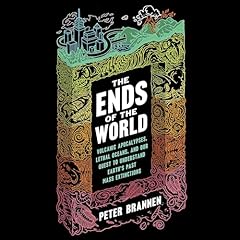
The Clockwork Universe
Isaac Newton, The Royal Society, and the Birth of the Modern World
No se pudo agregar al carrito
Add to Cart failed.
Error al Agregar a Lista de Deseos.
Error al eliminar de la lista de deseos.
Error al añadir a tu biblioteca
Error al seguir el podcast
Error al dejar de seguir el podcast
 Exclusivo para miembros Prime: ¿Nuevo en Audible? Obtén 2 audiolibros gratis con tu prueba.
Exclusivo para miembros Prime: ¿Nuevo en Audible? Obtén 2 audiolibros gratis con tu prueba.Compra ahora por $20.78
-
Narrado por:
-
Alan Sklar
-
De:
-
Edward Dolnick
The Clockwork Universe is the story of a band of men who lived in a world of dirt and disease but pictured a universe that ran like a perfect machine. A meld of history and science, this book is a group portrait of some of the greatest minds who ever lived as they wrestled with natures most sweeping mysteries. The answers they uncovered still hold the key to how we understand the world.
At the end of the 17th century, an age of religious wars, plague, and the Great Fire of London when most people saw the world as falling apart, these earliest scientists saw a world of perfect order. They declared that, chaotic as it looked, the universe was in fact as intricate and perfectly regulated as a clock. This was the tail end of Shakespeare's century, when the natural and the supernatural still twined around each other. Disease was a punishment ordained by God, astronomy had not yet broken free from astrology, and the sky was filled with omens. It was a time when little was known and everything was new. These brilliant, ambitious, curious men believed in angels, alchemy, and the devil, and they also believed that the universe followed precise, mathematical laws, a contradiction that tormented them and changed the course of history. The Clockwork Universe is the fascinating and compelling story of the bewildered geniuses of the Royal Society, the men who made the modern world.
Download the accompanying reference guide.©2011 Edward Dolnick (P)2011 Audible, Inc.Los oyentes también disfrutaron:




















Las personas que vieron esto también vieron:


















Any additional comments?
This book was very enlightening. There was so much in it that I didn't know or had never thought about. Since I'm currently taking Calculus II as part of my Computer Science degree, I found this book to be doubly interesting.Very Enlightening
Se ha producido un error. Vuelve a intentarlo dentro de unos minutos.
Ok,I admit I am a history junkie, especially when the story is told in an interesting, factual way. If my math teachers in High School and College has shared some the history in this book as background material for algebra and calculus, I would have certainly paid more attention and would have found the subject much more interesting.
This story makes the numbers on the page come alive, and they tell a fascinating story- rivals, feuds, discoveries, court intrigue, intelligence, jealousy- its all there.
The story is factual and informative, the pace is good, the length is just about right, and the reader is solid. The narrator has a nice voice, a 'math' voice and tells the story with a tone that keeps you interested in learning what is behind the next corner, or the next decimal.
If you like factual history, this is a story for you. If you like to know things like how ideas evolved, the struggles early inventors and mathematicians faced in revealing details like the earth revolving around the sun, which went against current beliefs (ever feel like taking on a Pope?) then this is an audio you will enjoy.
Is the book worth a credit? Yes and I would listen to this story again at the right time. This is also an audio I would use with my family on a short road trip, to spark their interest in math, physics and astronomy.
One deal breaker for me in audios is language and sex. Authors who use excessive profanity, in my mind lack imagination and loose something in their story telling. Same with sex scenes that are overly descriptive and drawn out.
Nothing like that in this story, it will stimulate your mind and your imagination.
Even Mathematicians have feuds ....
Se ha producido un error. Vuelve a intentarlo dentro de unos minutos.
Mostly great, with some details flubbed
Se ha producido un error. Vuelve a intentarlo dentro de unos minutos.
indepth review of Newton and an age of discovery
Se ha producido un error. Vuelve a intentarlo dentro de unos minutos.
If you could sum up The Clockwork Universe in three words, what would they be?
Very good at placing Newton in ideological as well as scientific and historical context. Does a great job at explaining Newton's thought to the non-specialist and why it is still important.What was one of the most memorable moments of The Clockwork Universe?
Newton's fight with Hook and others was well narrated.Which character – as performed by Alan Sklar – was your favorite?
N/AWas this a book you wanted to listen to all in one sitting?
No, but I did want more.Any additional comments?
Money well spent on a really interesting and informative read.Makes Newton and other enlightenment figures come
Se ha producido un error. Vuelve a intentarlo dentro de unos minutos.


